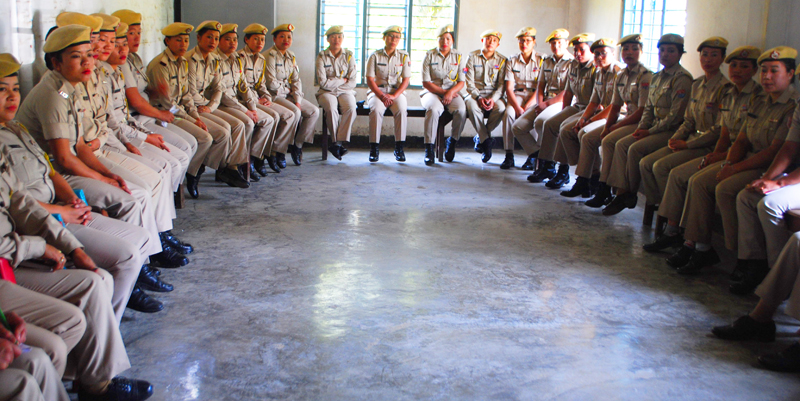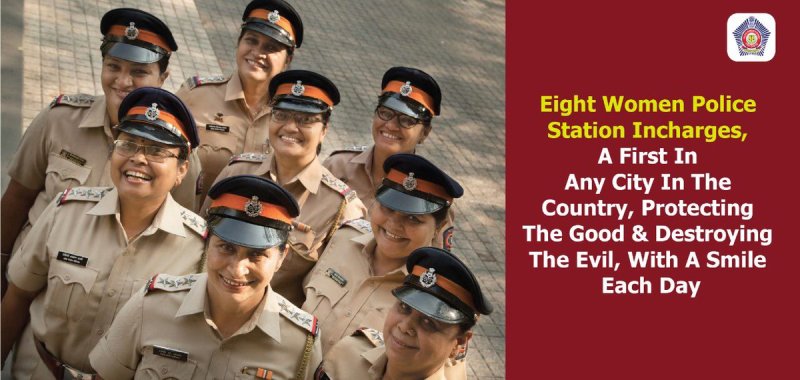In a landmark move by the financial capital of the country, Mumbai creates history by becoming the first city of India, to have as many as eight women police station in-charges.
Taking to Twitter, Mumbai Police made the following announcement:
Trying to keep up with the city’s trend of setting examples! #InspiredByMumbai pic.twitter.com/cEyEu7GOmg
— Mumbai Police (@MumbaiPolice) March 31, 2018
The names of the eight women police station in-charges are–Alka Mandave (Airport Police Station), Rashmi Jadhav (Cuffe Parade Police Station), Mrudula Lad (Sion Police Station), Lata Shirsat (Sahar Police Station), Jyotsna Rasam (Vanrai Police Station), Rohini Kale (Pantnagar Police Station), Vidhyalaxmi Hiremath (Aarey Police Station) and Kalpana Gadekar (BKC Police Station). Rashmi Jadhav, in charge of Cuffe Parade Police Station said that being female in charge of a police station, will help women and it will be more comfortable for girls and women to come and report crimes against them.
In the report titled, “Rough Roads to Equality: Women Police in South Asia”, Commonwealth Human Rights Initiative, a Delhi based organization, spoke to more than 100 policewomen across five Indian states, and found that a generic view of policing being a man’s job was the major hurdle for policewomen in their careers. The report also discussed that authorities often fail to understand the potential contribution of women in effective law enforcement. Additionally, the report went on to discuss that in India, policewomen are mostly given desk jobs or tasks that are far from front line policing. Due to this, less than 1% of policewomen in India occupy senior ranks and almost 90% of them serve as constables. The consequences of this shortage of police women, is that this seems to be a significant barrier to improving the overall justice system to female victims of gender-based violence. The report stated that many women are reluctant to report crimes such as rape or sexual harassment to male officers, the report said.
Through our Safe Cities project, Centre for Social Research had an interaction with 37 women officers of the Indian Reserve Battalion in Manipur, wherein the women delineated several difficulties that prove to be hindrances in their careers- no toilets for women, discomfort while interacting with male colleagues, high rates of miscarriage due to lack of facilities for pregnant women, lesser promotions and district postings for women, along with many other socio-cultural issues due to inherently male dominated culture prevalent in the police.


The role of Civil Society Organizations like the Centre for Social Research (CSR) is in taking on the baton to create holistic capacity building programs that cover the existing loopholes in the system. In this endeavor, CSR has undertaken gender sensitization training for police officials with the intention of generating dialogue on sustained action in mitigation of crimes against women. National Police Academy (2015), Samba District Police Lines (Jammu – 2017), Bengaluru City Police (2017), Manipur Police Training College (2017) and Puducherry Police Training School (2017). In the years 2018-2020, in association with the Asia Foundation, CSR is conducting gender sensitization training for police officials in the states of Madhya Pradesh and Rajasthan, keeping in mind the context of urban spaces and women’s safety.
We sincerely hope that police forces across the country take inspiration from this move of Mumbai Police, and incorporate more women in the police forces. It is only through an increase of women in significant roles within the police, that we can hope for some improvement in the overall justice system.





